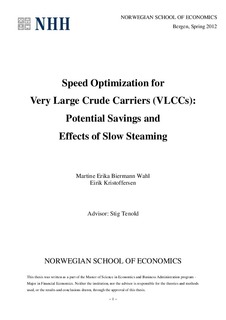| dc.contributor.author | Wahl, Martine Erika Biermann | |
| dc.contributor.author | Kristoffersen, Eirik | |
| dc.date.accessioned | 2012-12-12T09:12:33Z | |
| dc.date.available | 2012-12-12T09:12:33Z | |
| dc.date.issued | 2012 | |
| dc.identifier.uri | http://hdl.handle.net/11250/169979 | |
| dc.description.abstract | The main purpose of this thesis has been to estimate the optimal speed for Very Large Crude Carriers (VLCCs), and examine how this has changed since the financial crisis in 2008.1 The optimal speed will be compared with the development in actual speed for the VLCC fleet. We present two speed optimization models and provide results of optimal speed under different market conditions.
According to our results, the actual speed of VLCCs has decreased with 16% since mid 2008. Both optimization models suggest that optimal speed still is below actual speed. Our analysis further indicates that it exists a significant cost saving potential from reduced speed. We have analyzed several effects of reduced speed, including environmental, legal and piracy effects. We conclude that these will not have a significant impact on the speed decision. Our findings indicate that under the current market conditions the VLCC fleet should continue to slow steam, and in fact further reduce speed as there still exists a significant potential for cost savings. | no_NO |
| dc.language.iso | eng | no_NO |
| dc.subject | financial economics | no_NO |
| dc.title | Speed optimization for very large crude carriers (VLCCs) : potential savings and effects of slow steaming | no_NO |
| dc.type | Master thesis | no_NO |
| dc.subject.nsi | VDP::Social science: 200::Economics: 210::Business: 213 | no_NO |
